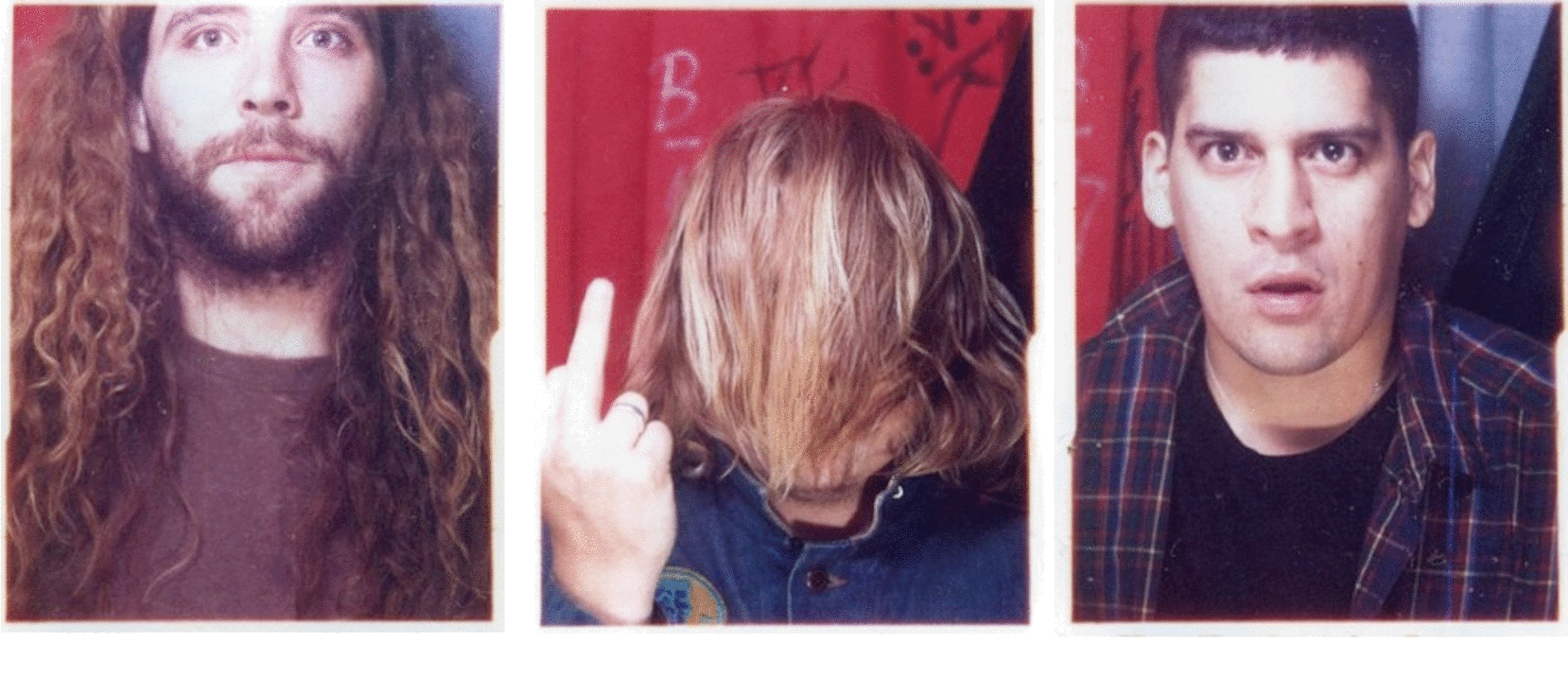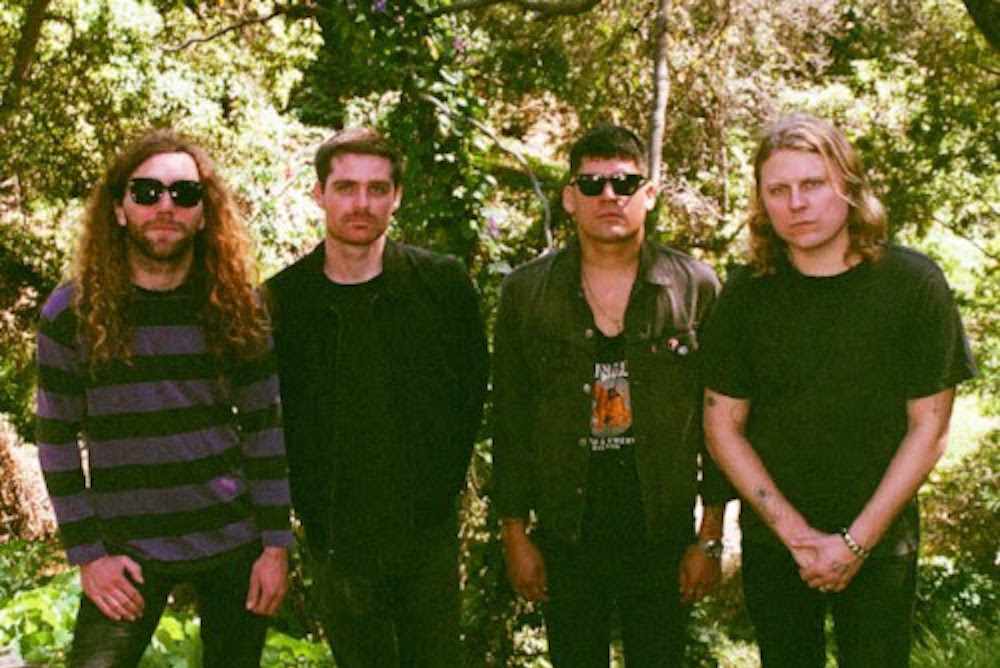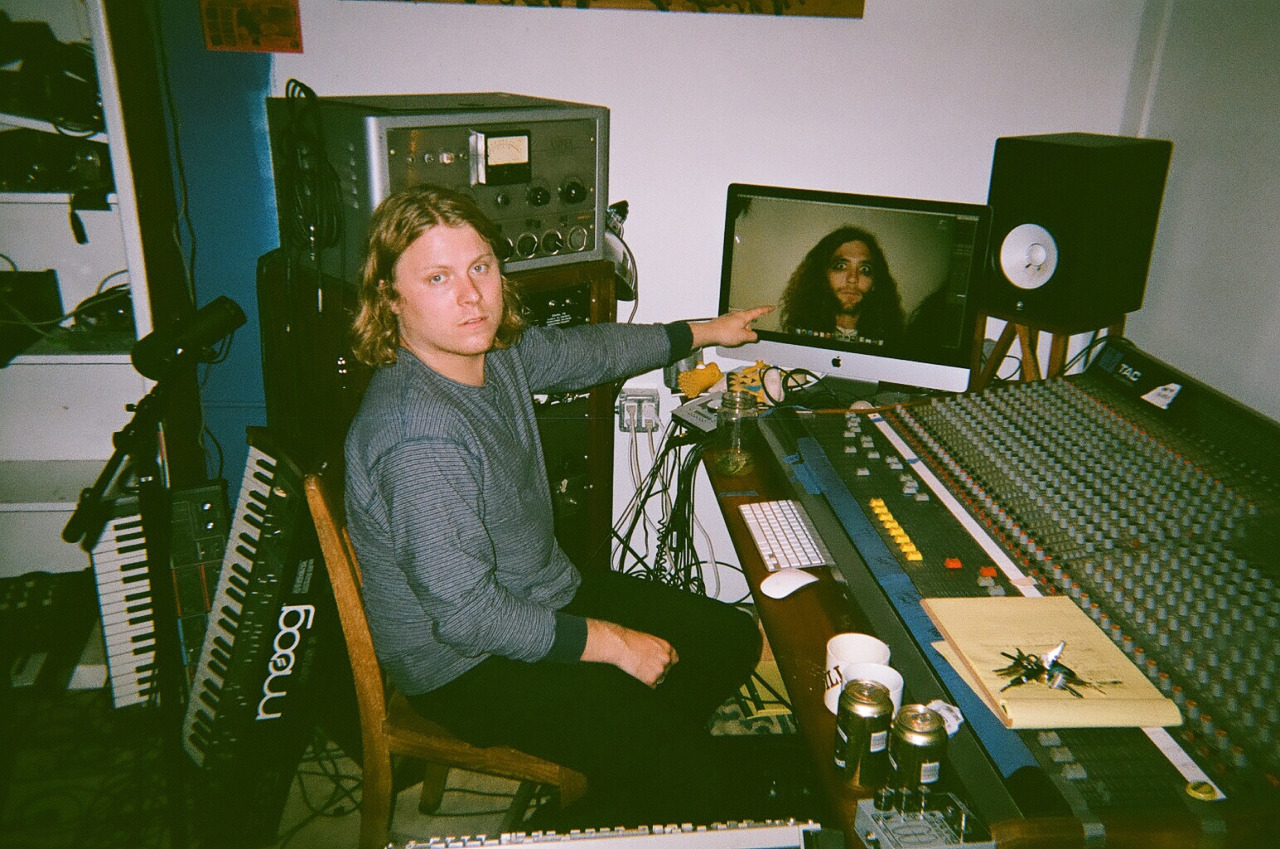GØGGS — a.k.a. the super-trio of Ex-Cult vocalist Chris Shaw, lo-fi renaissance man Ty Segall, and Segall’s Fuzz bandmate Charles Moothart’s — have been planning a collaboration for three years. According to lead vocalist Shaw, he and Segall began formulating their side project when the two toured together in 2013, frequently pairing off in their free time to write.
Finally, last July, they solidified a plan to record at Segall’s home studio in Los Angeles. “[Segall] gave me a call and said, ‘Hey man, I think I have some time, would you wanna come out for like a week and do some recording?’,” says Shaw, who still sounds surprised at the partnership, given the guys’ inherent songwriting differences — Shaw tends to thrive on musical chaos, while Segall is more organized in his approach. But recording took almost no time at all. “Basically we cranked out an album in about a week. [Segall] was playing the role of guitarist, drummer, back-up vocalists, producer, and engineer on the album. Which is pretty much what he does all the time.”
The result, which you can stream below, features ten jagged garage-punk blasts, which frequently reference the City of Angels’ less-desirable features (a sprawling trash pile in “Glendale Junkyard,” corrupt cops in “Needle Tradeoff”). GØGGS also welcomes guest spots from more West Coast musicians and Segall associates like Mikal Cronin, Wand‘s Corey Hanson, and VIAL‘s Denée Petracek.
SPIN called up Shaw at his home in Memphis to find out more about teaming up with Segall to write GØGGS‘ debut (out on July 1 via In the Red), whether or not their band’s name means anything, and where they’ll take it from here.
How do your and Ty’s personal styles mesh on this record?
His songs have structure to them. So they’re a little bit more difficult for me. I think I pretty much butchered half of [Ty’s] live discography at this point, but for some reason he’s still interested in having me do vocals.
Maybe it’s freeing somehow for Ty to let go of that structure.
Yeah, when we went on tour together I learned a handful of his songs, and every time I would get up and sing I would think, “Man, I’m f**king this up. I can’t believe they’re still letting me do this.” But they always seemed like they were into it, so.
Who came up with the name?
Ty came up with it. It’s a totally made-up word. But I think that’s kind of cool because it can mean a bunch of different things. The name came after the initial demos that he sent me. He just called me one day and was like, “I’m thinking of GØGGS, and what do you think about that?” And I said, “What does it mean?” And he said, “I don’t think it means anything.” And I was like, “Cool, let’s do it.”
With you based in Memphis and Ty on the West Coast, how did you actually trade ideas?
Ty would send me three or four rough demos that had everything but vocals. I immediately liked all of them. I’m pretty sure all of those demos made it on to the album — as complete songs, obviously. The other half [of the album] was written while I was [in L.A.].
Can you tell me a little bit about the singles “Glendale Junkyard” and “Needle Tradeoff”?
“Glendale Junkyard” was inspired by one of the biggest junkyards I’ve ever seen. I wanted to touch on the excess of living the high life in Los Angeles. I don’t live in L.A., so I don’t really think that I’m capable of writing, like, the anthem for a city or anything. But that’s a city that’s always really inspired me, even when I was first getting into punk music. Some of my favorite bands have been from L.A. — bands like the Germs and X. It’s the type of stuff I grew up with.
“Needle Tradeoff” is inspired by the 1982 movie Vice Squad. It’s this weird B-movie about the underworld of L.A. Vice cops. Wings Hauser is the main character and he’s just this really f**ked up dude. The big premise of the movie [involves] drugs, prostitution, and violence. Those topics can make for a great film. I don’t really condone the behavior that goes on in that movie, but it’s a side of L.A. and Hollywood that you don’t normally see in the movies. That really stuck with me.
Do you have a favorite song on the GØGGS record?
I honestly like some of the weirder stuff. I mean, up until now we’ve released some of the more straightforward punk [songs]. There’s definitely some weird s**t on the album, and I’m excited to hear people’s response to that. So far I think it hasn’t been what people expected, but at the same time they can wrap their head around it. There’s definitely some stuff on the album that will challenge what you’ve heard so far. That’s what we think the album should do.
Coming from Tennessee, was there any part of you that wanted to infuse a style of punk that represents your hometown on the record?
I think Ex-Cult has kind of always been a wild card in the Memphis punk scene. Before Ex-Cult, a lot of the bands that were popular from the Memphis punk scene were a lot more garage-oriented. Bands like the Oblivians — they took a lot from ’60s garage music. I think Ex-Cult and other bands that I’ve been in in the past come from a more hardcore-punk background. So I think I was keeping in the same vein of what I’ve kind of carved out with Ex-Cult, except taking it to a new city with a new group of musicians that are influenced by completely different things.
How did GØGGS team up with album guests Mikal Cronin, Wand’s Corey Hanson, and VIAL’s Denée Petracek?
Those are all people that are in and out of Ty’s place all the time. I meet Mikal when Ex-Cult and Ty Segall went on tour together. Denée is Ty’s girlfriend. She had a really awesome voice. She was part of the whole experience because I was crashing with Ty and Denée the whole time. Then Cory is another guy who we’d kind of just hang out with all week. I mean, this was obviously me and Ty and Charles [Moothart’s] project, but I think when you have a group of musicians that are that talented just kind of hanging around at your disposal, it makes sense to be like, “Hey man, get in here and put this s**t on this album.”
You guys really do sound like a band that’s been together for longer than one record.
I think that was the goal. And that’s also a product of me, Ty, and Charles being friends for years. I think sometimes people think about bands like ours [where someone gets] a call and it’s like, “Hey man, come down to the studio and drop vocals on this one song. Or play guitar on this one song.” It wasn’t like that at all. This was something that we talked about for a long time, so I think that’s why it feels like a very cohesive record. Honestly, that’s kind of funny because we haven’t even played a large show yet.
After your smattering of tour dates this fall, do you plan to expand from there?
No, I don’t think so. Both Ty and I are pretty busy with our other projects, and so is Charles. Charles had a solo record that came out; I’m sure he’s gonna be doing more stuff with that. The other band that I’m in, Ex-Cult, just finished our third LP, so we’re gonna be touring pretty heavy on that. And Ty seems like he’s always in ten places at once.
I think the goal is just to see what happens. I think we all had a really amazing time recording this album, and we’re all really looking forward to the shows, but that’s the cool thing about this band. There’s no pressure. It was all just, “Do this s**t because we want to do it.”






